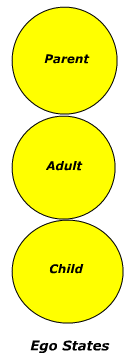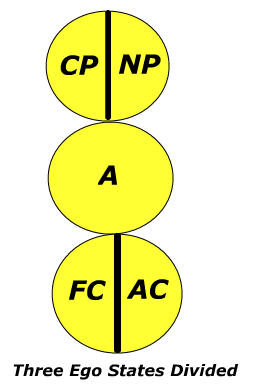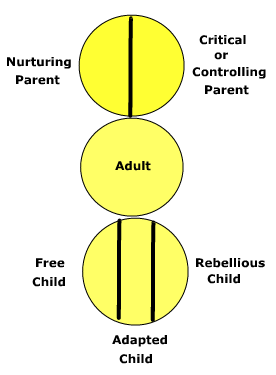|
Ego-States
Development Of Ego States
When first born, the infant's awareness is centered on personal needs and comforts.
The baby seeks to avoid painful experiences and responds at the feeling level.
Almost immediately the infant's unique Child ego state emerges.
(Prenatal influences on the Child ego state had not yet been determined.)
The Parent ego state develops next.
It is often first observed when the young child plays at parenting, imitating parental behavior.
Sometimes it's a shock for parents to see themselves being played back.
Sometimes they are pleased.
The Adult ego state develops as the child tries to make sense out of the world and figures out
that other people can be manipulated.
The child may ask, " Why do I have to eat when I'm not hungry?" and may try to manipulate others
by faking a stomach ache in order to avoid eating.
The personality pattern in transactional analysis is based on ego states
or on structural analysis
Berne teaches that ego states contain feelings and thoughts that lead to attitudes
or states of mind.
The three ego states are the Parent, Adult, and Child

The Parent ego state is a set of feelings, thinking and behavior that we have copied
from our parents and significant others.
As we grow up we take in ideas, beliefs, feelings and behaviors from our parents
and caretakers.
If we live in an extended family, then there are more people to learn and take in from.
When we do this, it is called, introjecting, and it is just as if we take in the whole
of the care giver.
For example, we may notice that we are saying things just as our father, mother,
grandmother may have done, even though, consciously, we don't want to.
We do this as we have lived with this person so long that we automatically reproduce
certain things that were said to us, or treat others as we might have been treated.
The Adult ego state is about direct responses to the here and now.
We deal with things that are going on today in ways that are not unhealthily influenced
by our past.
The Adult ego state is about being spontaneous and aware with the capacity for intimacy.
When we are in our Adult we are able to see people as they are,
rather than what we project onto them.
We ask for information rather than stay scared and rather than make assumptions.
Taking the best from the past and using it appropriately in the present
is an integration of the positive aspects of both our Parent and Child ego states.
So, this can be called the Integrating Adult.
Integrating means that we are constantly updating ourselves through our every day
experiences and using this to inform us.
In this structural model, the Integrating Adult ego state circle is placed in the middle
to show how it needs to orchestrate between the Parent and the Child ego states.
For example, the internal Parent ego state may beat up on the internal Child, saying,
"You are no good, look at what you did wrong again, you are useless".
The Child may then respond with "I am no good, look how useless I am,
I never get anything right".
Many people hardly hear this kind of internal dialogue as it goes on so much
they might just believe life is this way.
An effective Integrating Adult ego state can intervene between the Parent and
Child ego states.
This might be done by stating that this kind of parenting is not helpful and asking
if it is prepared to learn another way.
Alternatively, the Integrating Adult ego state can just stop any negative dialogue
and decide to develop another positive Parent ego state perhaps taken in from other people
they have met over the years.
The Child ego state is a set of behaviors, thoughts and feelings which are replayed
from our own childhood.
Perhaps the boss calls us into his or her office, we may immediately get a churning
in our stomach and wonder what we have done wrong.
If this were explored we might remember the time the head teacher called us in to tell us off.
Of course, not everything in the Child ego state is negative.
We might go into someone's house and smell a lovely smell and remember our grandmother's
house when we were little, and all the same warm feelings we had at six year's of age
may come flooding back.
Both the Parent and Child ego states are constantly being updated.
For example, we may meet someone who gives us the permission we needed as a child,
and did not get, to be fun and joyous.
We may well use that person in our imagination when we are stressed to counteract
our old ways of thinking that we must work longer and longer hours to keep up with everything.
We might ask ourselves "I wonder what (so and so) would say now".
Then, on hearing the new permissions to relax and take some time out, do just that
and then return to the work renewed and ready for the challenge.
Subsequently, rather than beating up on ourselves for what we did or did not do,
what tends to happen is we automatically start to give ourselves new permissions
and take care of ourselves.
Alternatively, we might have had a traumatic experience yesterday which goes into
the Child ego state as an archaic memory that hampers our growth.
Positive experiences will also go into the Child ego state as archaic memories.
The positive experiences can then be drawn on to remind us that positive things do happen.
The process of analyzing personality in terms of ego states is called structural analysis.
It is important to remember that ego states do not have an existence of their own,
they are concepts to enable understanding.
Therefore it is important to say "I want some fun" rather than "My Child wants some fun".
We may be in our Child ego state when we say this, but saying "I" reminds us to take
responsibility for our actions.
Eric Berne distinguishes between three ego states,
He divides the Parent ego, divided into the Critical Parent and the Nurturing Parent
He doesn’t divide the Adult ego.
He divides the Child ego into the Free Child and the Adapted Child.
Later, some of his students, added the Rebellious Child.
I have added RC to the second graphic so that you might be acquainted with this position.
In my counseling, I made it a part of the FC when he or she was rebelling.
When a child is verbally or physically punished by a parent, the child's response may be
to become rebellious or aggressive.
The Rebellious Child (RC) mode develops out of a pattern of repeated rebellious behavior
in response to efforts to suppress his or her feelings and desires.
The RC trait forms both in response to critical parents and also to overly intrusive
nurturing parents.
This trait can also emerge when inconsistent parenting causes confusion or a sense
of uncertainty in the child.
RC has a positive side characterized by independence and autonomy that makes for
a strong personality capable of bearing up under extremely difficult circumstances
and of exercising considerable personal strength.
On the other hand, RC modes tend toward excessive behavior,
and often rebel by expressing overt dissatisfaction - behavior that is often destructive
to human relationships.
Some TA psychologist considers RC as a distinct mode.
This is because the type of rebellion described above is expressed and formed differently,
depending on the person, and cannot be properly understood as part of
a more general pattern.
But sometimes the child responds in a manner that is contrary to the mother's expectations,
coming from another arm of the Child Ego State, not the Adapted Child (or complying Child),
but from the Rebellious Child: "I am not going to wear that raincoat because I don't like it."
Now that mother mom has engaged the more difficult Rebellious Child Ego State
and may shift to her Critical Parent in an attempt to get the job done:
"You will wear this rain coat if I say you will."
One form of the Destructive Child ego state is the Rebellious Child.
When people are in this ego state, they aren’t going to listen to anyone who tells them
what to do.
They either rebel openly by being very negative or rebel subtly by forgetting,
being confused, or putting off doing something that someone wants them to do.
Persons behaving from Rebellious Child will not do anything an authority figure asks them
to do even if it makes sense.
When I encountered someone with a pronounced RC which is a problem for the individual,
I usually included it in an egogram.
 
Berne also recognizes the different ego states according to their body language,
their tone of voice, and their verbal statements.
The Parent-ego is derived from the behavior of our parents or of authoritative persons
which we have taken over, and which is like a tape which has been saved in our brains.
When we are in our Parent-egos, we act like our parents or those important for
our upbringing would have acted.
The Parent ego can be either an attitude out of our own decision concerning values
and orientations or an attitude which does not represent the results of our own
considerations or our own independent decisions; it is taking over opinions: in this case
we are not autonomous in the Parent ego state.
The Parent ego punishes and praises, criticizes and encourages, is responsible for education,
tradition, values, ethics and consciousness.
What one does; how one dresses oneself; how one behaves; how one treats others;
what one finds to be good or bad, correct or incorrect, fair or unfair:
these principles and rules, handed down and not reflected, to which we automatically
orient ourselves stem from the Parent ego.
Anyone who frequently says "one" instead of "I" has without doubt
a strong Parent ego: "One should receive understanding" instead of
"I would like more understanding for my situation."
Transactional Analysis distinguishes between two categories of Parent egos:
Critical Parent is a controlling, punishing and restrictive stance frequently based
on pre-judgments.
We can easily identity it in the nonverbal: the raised index finger, the knitted eyebrows,
the wrinkled forehead, accusatory voice, arms folded across the breast.
Verbally, phrases like must, should, always, never are used.
Always and never are always parent ego words which characterize the border lines
around an archaic system that from the outset allows no new information in.
The solicitous and/or benevolent, supportive or Nurturing Parent ego has all
of the characteristics of a solicitous protector: caring and attention, praising,
supporting, helping, feeding, teaching, comforting.
Click on left menu to view Behavior Clues to Ego State Diagnosis
|